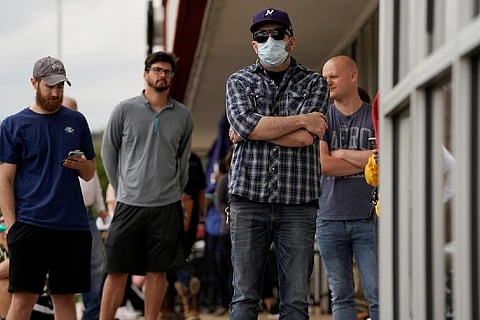

Chennai
In late March, Britney Ruby Miller, co-owner of a small chain of steakhouse restaurants, confidently proclaimed that once the viral outbreak had subsided, her company planned to recall all its laid-off workers. Now? Miller would be thrilled to eventually restore three-quarters of the roughly 600 workers her company had to let go. “I’m being realistic,” she said. “Bringing back 75% of our staff would be incredible.” Call it realism or pessimism, but more employers are coming to a reluctant conclusion: Many of the employees they’ve had to lay off in the face of the pandemic might not be returning to their old jobs anytime soon. Some large companies won’t have enough customers to justify it. And some small businesses won’t likely survive at all despite aid provided by the federal government.
If so, that would undercut a glimmer of hope in the brutal April jobs report the government issued Friday, in which a record-shattering 20.5 million people lost jobs: A sizable majority of the jobless — nearly 80% — characterised their loss as only temporary. That could still turn out to be the case for some. The federal government may end up allocating significantly more financial aid for people and small businesses. And more testing for the coronavirus, not to mention an eventual vaccine or an effective drug therapy, would make more Americans comfortable returning to the restaurants, shops, airports and movie theatres they used to frequent. That, in turn, would lead companies to recall more laid-off workers.
Congress remains divided about additional aid, with some Republicans expressing concern about escalating federal debt. President Donald Trump’s top economic adviser, Larry Kudlow, said last week that negotiations have “paused.” If most layoffs become permanent, the severe recession the economy has slid into would likely last longer, the recovery would be slower and the toll on laid-off workers would be harsher, economists say. Unemployment soared to 14.7% in April — the highest rate since the Great Depression, and analysts predict it will rise further in May and remain in double-digits into next year.
“For a lot of those furloughed, a non-trivial number will have no job to go back to, because the company they worked for will have failed or will need fewer workers than they used to,” said Claudia Sahm, a former Federal Reserve economist who is now director of macroeconomic policy at the Washington Center for Equitable Growth.
Yet business won’t be returning to what it was before. In Kentucky, the restaurants will be limited to 33% of capacity. They are putting six feet between tables in all their restaurants, thereby limiting seating. Miller estimates that the company’s revenue will plunge by half to three-quarters this year.
And expenses are rising because the company must buy face masks and other equipment for the workers it does recall and restock its food, drink, and equipment supplies. If many of the job losses do prove only temporary, it would raise the possibility of a relatively swift economic recovery. It’s much easier for someone out of work to return to a former job than retrain for a new one or shift to a new industry. After the previous three recessions, the vast majority of people who were laid off lost their jobs permanently. Some were essentially replaced by new software or factory robots. In other cases, their employers folded or entered new lines of business.
Even after government closure orders are lifted, many consumers won’t likely be comfortable shopping, eating out or attending concerts, movies or sporting events, especially as they used to — as part of tightly seated crowds. Not until the virus is well under control can a full economic recovery likely happen, economists say.
Associated Press
Visit news.dtnext.in to explore our interactive epaper!
Download the DT Next app for more exciting features!
Click here for iOS
Click here for Android